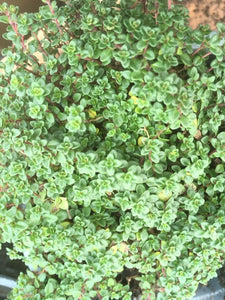Thyme: The Versatile Herb for Every Kitchen
Thyme, a Mediterranean
herb, is an essential ingredient in countless dishes and beverages. Its earthy, minty, and slightly lemony flavour adds depth and complexity to recipes and as well as culinary uses, it has medicinal, and other beneficial properties.
Thyme Plant: A Brief Overview
Thyme is a perennial evergreen herb with small, fragrant leaves. There are many different species of thyme, each with a unique flavour profile and appearance. The most common type of thyme used in cooking is Thymus vulgaris, also known as common thyme or garden thyme. This variety is known for its pungent, aromatic flavour and is widely used in various cuisines.
Thyme's Origins and History
Thyme has a rich and long history. The ancient Egyptians used thyme as a key ingredient in their embalming process, while the ancient Greeks and Romans believed that thyme symbolised courage and strength. They even wore thyme sprigs in their garments before going into battle.
Using Thyme in the Kitchen: A Culinary Guide
Thyme's complex flavour profile makes it a versatile addition to various dishes. Here are some popular ways to incorporate thyme into your cooking:
Meat Dishes
Thyme pairs exceptionally well with different types of meat, including beef, lamb, pork, and poultry. Its earthy flavour complements and enhances the natural taste of the meat. You can use thyme as a seasoning for roasted or grilled meats or include it in your marinades and sauces to impart its distinctive flavour.
Seafood Dishes
The slightly lemony taste of thyme works wonders in seafood dishes. The herb's subtle flavour adds a refreshing touch to fish, shellfish, and other seafood without overpowering their delicate taste. Thyme can be used in fish stews, grilled fish dishes, or even as a seasoning for seafood pasta.
Vegetable Dishes
Thyme is a wonderful addition to vegetable dishes, especially those featuring root vegetables, tomatoes, mushrooms, and leafy greens, adding an extra layer of depth to the taste of the vegetables. Use thyme to season roasted or grilled vegetables, stir-fries, or even salads.
Soups and Stews
Thyme is a popular ingredient in soups and stews, as its flavour adds warmth and depth to the dish. Try adding thyme to soups, such as tomato soup, minestrone, or mushroom or add to hearty stews, like beef stew or vegetable stews, where its earthy flavour complements the other ingredients.
Bread and Baked Goods
Adding thyme to your bread or other baked goods can bring a unique and unexpected twist to their flavour. You can mix thyme with your dough, sprinkle it on top of your bread before baking, or even use it as a seasoning for savoury pastries.
Beverages and Cocktails
Thyme is not just for cooking; it can also be used to enhance the flavour of your beverages. You can use fresh thyme sprigs to infuse your water, tea, or even cocktails. Thyme-infused beverages have a refreshing and aromatic taste, making them perfect for hot summer days or cosy winter evenings!
Thyme's Medicinal Benefits: More Than Just a Culinary Herb
Apart from its culinary uses, thyme also boasts numerous medicinal properties. Here are some of the health benefits associated with thyme – but it’s always best to check with a healthcare professional!
Cough Remedy
Thyme is rich in vitamin C and has been used as a natural remedy for coughs and respiratory infections. You can make a simple thyme cough syrup by boiling water with thyme and adding honey and lemon juice. This homemade syrup can help soothe your throat and alleviate cough symptoms.
Source of Essential Vitamins
Thyme is not only rich in vitamin C, but it also contains vitamin A, potassium, copper, fibre, iron, selenium, and manganese. Including thyme in your diet can help you meet your daily requirement for these essential nutrients.
Hair and Scalp Health
Thyme has antiseptic and antifungal properties that can help cleanse, heal, and soothe the scalp. It is often used in deep cleansing shampoos to help treat dandruff and stimulate hair follicles, promoting hair growth. You can use thyme oil in your hair care routine to improve the health of your hair and scalp.
Mood Booster
Thyme essential oil contains carvacrol, a substance known to boost neural activity and promote feelings of well-being. Diffusing thyme essential oil in your home can help improve your mood and create a more positive atmosphere.
Digestive Aid
Thyme has antibacterial and antimicrobial effects, which can help improve gastrointestinal and intestinal health. Consuming thyme in your diet, either fresh in salads or steeped in tea, can provide these digestive benefits.
Preserving and Storing Thyme for Future Use
To ensure you always have thyme on hand, it is essential to know how to preserve and store it properly. Fresh thyme can be stored in the refrigerator for up to two weeks, while dried thyme should be kept in a cool, dark place and used within six months. You can also freeze fresh thyme by washing the herbs and placing them in labelled plastic freezer bags. Alternatively, you can dry fresh thyme by tying the stems together and hanging them upside down in a room with low humidity.
Thyme is a versatile and flavourful herb that deserves a place in every kitchen. Its unique taste and numerous health benefits make it a valuable addition to various dishes, from meat and seafood to vegetables and beverages. By incorporating thyme into your cooking and taking advantage of its medicinal properties, you can elevate your culinary creations and improve your overall well-being. So, go ahead and explore the many ways you can use this remarkable herb in your kitchen and enjoy the delicious and healthful benefits it has to offer.

































